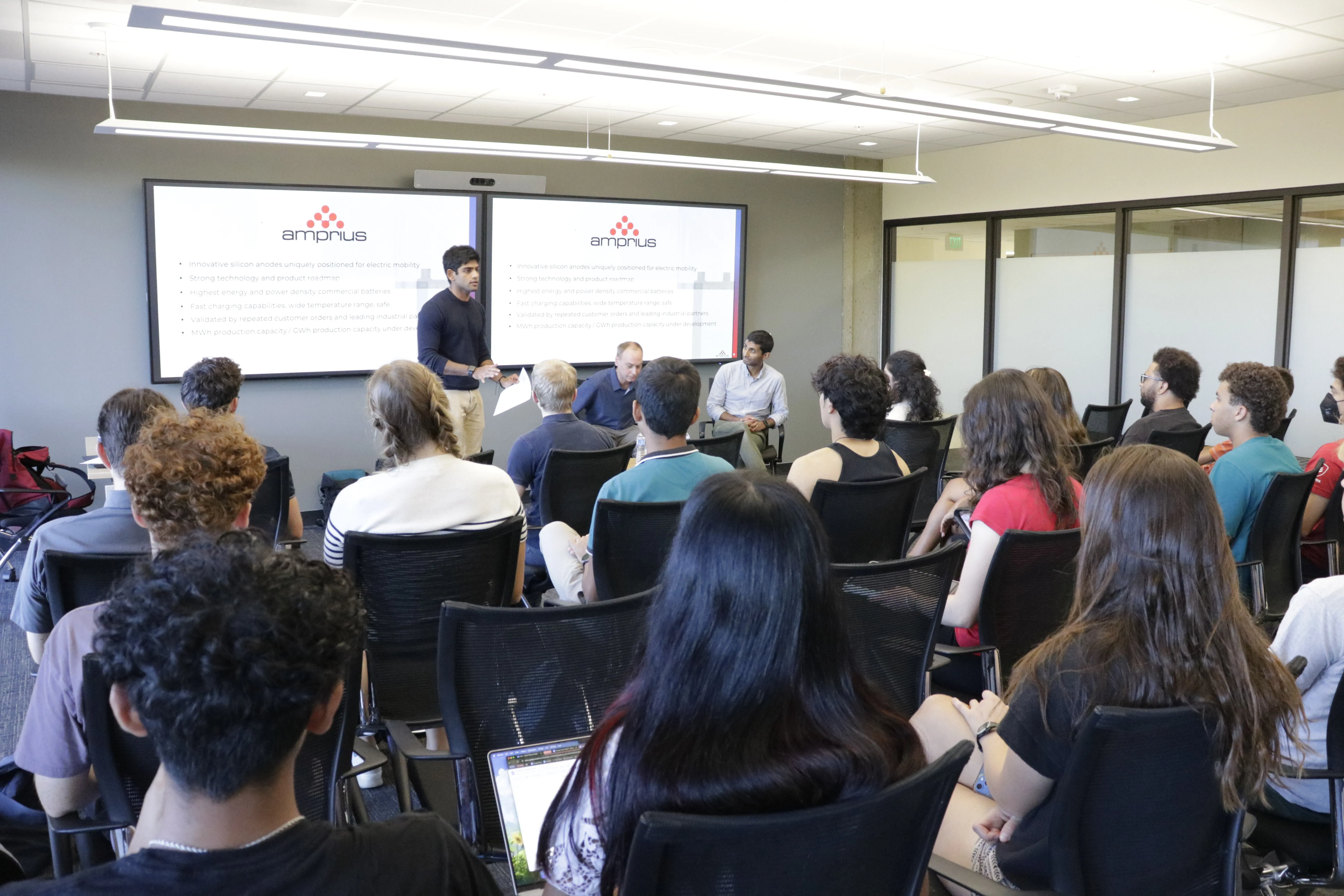Sustainable battery experts Tarun Narayan Ph.D. ’16 and Scott Zafiropoulo urged curiosity and cross-discipline collaboration at the Stanford Energy Club’s kickoff fireside chat event on Friday.
Part of SustainX, the club’s flagship event which strives to bring together leaders in climate technology and sustainable energy, the panelists discussed pathways towards scaling sustainable energy resources. Narayan, principal engineer of Antora Energy, and Zafiropoulo, marketing executive at Amprius Technologies, addressed a crowd of over 60 members of the Stanford community, from undergraduates studying material sciences and engineering to Ph.D. students working on batteries.
Rohan Parekh, M.S. ’25, co-president of the Stanford Energy Club and moderator and organizer of the event, said the club’s ability to bring in influential voices of the industry has helped transform the organization into a space for meaningful discussions and inspiration for innovation.
During the panel, Narayan and Zafiropoulo shared strategies based on their own experiences in industry. Antora Energy, founded in 2018, produces carbon-based thermal batteries to convert wind and solar energy — currently the lowest-cost source of primary energy — into reliable industrial energy. The modular batteries store intermittent energy from the wind and sun, which can then be used to fuel industrial operations.
Amprius Technologies, founded in 2008, creates high energy lithium ion batteries. The batteries rely on pure silicon nanowires for their uniquely high energy and power density and their quick charge rate capability.
Zafiropoulo presented strategies for partnering with other companies along the supply chain. He emphasized the need for a long-term plan and working with companies that will help on the path to achieving that plan.
The panel covered topics from logistics and operations to the business of strategic partnerships and customer feedback. Narayan spoke on their strategy for supply chains, sharing that a key aspect of securing a reliable supply chain is using materials readily available and sourced from a diverse range of suppliers. He said that by doing that, if one supplier drops out, there are still alternative sources available.
When it comes to balancing innovation with consistency in products, Narayan spoke on the cadence of their product design cycle, which iterates and improves constantly.
“Antora designs products in waves. We make lots of products at once, push them out, learn from them and then integrate what we learn into the next wave,” he said.
Narayan and Zafiropoulo also discussed the biggest roadblocks their companies faced in scaling up. Obtaining funding to propel scaling in sustainable energy, Zafiropoulo said, remains a significant hurdle in the field.
Difficult technical and organizational changes arise when a company begins to scale up production, Narayan said. He emphasized the inevitable shift in mindset from development to deployment.
The growing space of energy and the unique challenges of the industry self-select a passionate and spirited group of talent, Narayan said, underscoring the importance of curiosity and an interest in learning.
“In interdisciplinary companies, you need to be able to learn from different areas as you work, and you need to be willing to understand you’re not the expert on all topics,” Narayan said. “At Antora, everyone is very positive and willing to work with you. People are mission-oriented and talented.”
Both speakers highlighted the importance of a healthy work environment and enjoying time spent with co-workers. Zafiropoulo highlighted just how much time co-workers spend together, noting that sometimes people spend more time with their co-workers than with their family.
“You spend so much time with people at work, so making sure you have connections and enjoy spending time with them is important,” he said.

Yifan Wei, a first-year Ph.D. student in materials science and engineering, who currently conducts work with batteries, said he valued the conversation, which shed light on how companies are using batteries. Wei, who also has future plans to form a start-up or enter the industry, said the talk was helpful in broadening his understanding of the scene.
The Energy Club hopes to continue growing its platform by hosting a wider variety of events, from networking events to opportunities for startups to pitch their ideas to leading investors in the sustainability sectors, Parekh said.
“The goal is to foster deeper engagement and create pathways for students to translate their ideas into real-world impact,” Parekh said.
